
13 minute read
B & D Genetics: Breeding Out the Competition
from Arkansas Grown
International breeders make a home for themselves in Arkansas
Advertisement
In the heart of Arkansas rice country, where mills, silos, and combines are often the only things obscuring an expansive horizon, sits an innovative, and internationally recognized sheep and goat facility specializing in reproduction and genetics. It’s not a place one would expect the only approved multi-country sheep and goat semen and embryo export facility in the United States. But for B & D Genetics owners David and Brittany Carwell, there’s no place they would rather be than the Arkansas Delta. The married couple met while studying reproductive physiology in graduate school at Louisiana State University in Baton Rouge. They relocated to Cross County, Arkansas, to establish their business on farmland owned by David’s family. He is a Cherry Valley native. Simply put, B & D Genetics offers breeding and genetics services for sheep, goats, deer, and animals classified as small ruminants. Much like neighboring farms seek to find and replicate the best varieties of rice, B & D Genetics assists customers in reproducing the best genetics in the various sheep and goat breeds. They quickly recognized the export need and went through the rigorous process of becoming the only USDA-certified multi-country (including the European Union) export collection facility in the country. The demand for their services has exceeded expectations. “In order to be able to qualify your frozen products (semen and embryos) to go to multiple countries worldwide, you literally have to come to Cherry Valley, Arkansas. You can’t go anywhere else,” Brittany said. “We’re bringing animals of national-champion quality here to Arkansas for collection. Arkansas will be responsible for making these high-quality sheep and goat genetics available to the rest of the world.” The facility serves a brand-new industry, and the international community is taking notice. The products require worldwide distributorship, and the Carwells have multiple international contracts. They have planned multiple international trips in 2020 to grow the export business, and they have multi-year projects currently on going with producers from the European Union and Australia. “We wanted to find a niche for our company,” she said. “Right now, if you have the best goat in the U.S.A. and you want to ship semen to Brazil, you have to apply and get a permit. What we’ve done instead is try to standardize the process to where the products can go to more than one country at a time. No one has done that but us.” Before B & D Genetics, most places internationally wouldn’t accept genetic products from anywhere but New Zealand or Australia because of concerns about diseases. Because of their exacting standards and the New Zealand government’s rigorous certification process, B & D Genetics has effectively opened the international market to United States products. “Arkansas is a great location because we can service companies in North Dakota, New York, North Carolina, and Georgia.”
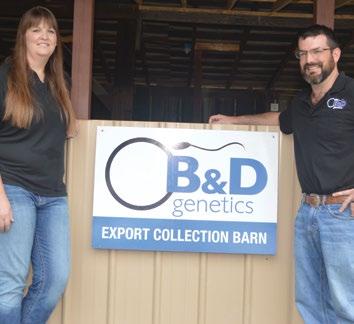
“We’re bringing American sheep and goat genetics to the world. It’s much more economical to ship frozen embryos than it is to ship live female animals,” Brittany Carwell said.
The Carwells own both B & D Genetics and Delta Livestock Diagnostics. B & D Genetics also offers artificial insemination, flushing and embryo transfer, in-vitro fertilization and semen collection for sheep, goat, and deer producers at their domestic clinic and through satellite centers located around the United States. Delta Livestock Diagnostic is a ruminant (cattle, sheep, goat, and deer) diagnostic lab that tests blood samples submitted by producers across the U.S. for pregnancy and diseases. They also operate B & D Land & Cattle which maintains herds of cattle, sheep, and goats as commercial embryo transfer recipients and work with professional breeders within the region. Their location remains ideal for the domestic side of their business as well as international, according to Brittany Carwell.
“Although there are a lot of practitioners in Oklahoma and Texas, Arkansas is a great location because we can service companies in North Dakota, New York, North Carolina, and Georgia,” she said.
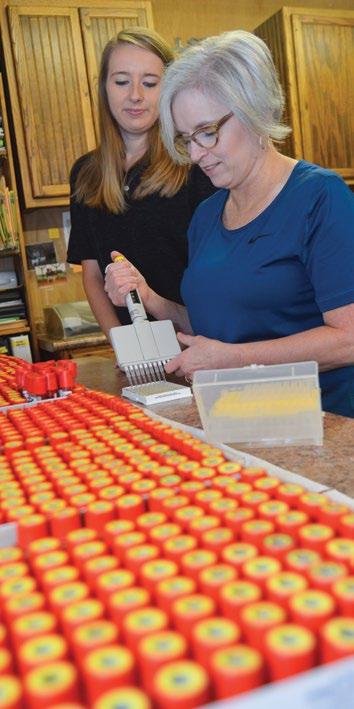
And while the Carwells never envisioned having an international business – especially one that has grown so quickly – they are thankful to work with other international companies based in Arkansas, specifically Heifer International, Winrock International, and the University of Arkansas’s World Trade Center in Rogers.
Want more information? Visit bdgenetics.com to learn more about B & D Genetics or B & D Land & Cattle.
LIVESTOCK & POULTRY OVERVIEW
Food Safety & Quality, Diagnostic Laboratory, Animal Health and Fairs
1.73 BILLION pounds of chicken meat inspected
ARKANSAS IS NATIONALLY RANKED #2 IN BROILER CHICKEN PRODUCTION, AND RANKED #5 IN TURKEY PRODUCTION
776 MILLION pounds of turkey meat inspected
1.52 BILLION chicken eggs graded
1.34 MILLION pounds of rabbit meat inspected
NATIONAL POULTRY IMPROVEMENT PROGRAM EXPANDS TO 14,156 CERTIFIED FLOCKS
30,243 calf hood vaccinations by livestock inspectors
36,710 equine infectious anemia (EIA) tests performed
83,526 cattle tagged for disease traceability
33,031 Health Certificates processed
650 Animal Movement Permits issued
OVER 2,400 hours worked by Livestock and Poultry Division Inspectors at Arkansas Fairs
51,020 exhibits inspected at fairs
694,346 people attended Arkansas Fairs
469,000 Diagnostic Procedures performed
OVER $1.7 MILLION provided to Arkansas Fairs

Healthy Trees, Healthy Lives
Arkansas Cities and Towns Embrace Community Forestry to Create Healthier Communities
For many decades, trees have been considered nice things to have in cities and towns. However, a growing body of research is providing strong evidence that having trees in communities is not just nice, but essential for human health and well-being. Research shows that having an abundance of well-cared-for trees in communities improves the health of residents, increases air and water quality, reduces flooding of city streets, and has numerous other valuable benefits. “There are some surprising benefits of having trees in communities, like the presence of trees reducing crime and violence,” says Harold Fisher, Urban Forestry Partnership Coordinator for the Arkansas Department of Agriculture Forestry Division. “Some of these benefits may be due to the positive effect trees have on mental health. People just feel better when they’re around trees.” Because trees grow well in Arkansas, many communities have offered these benefits in the past without much effort. However, increasing urbanization, the spread of nonnative pests and invasive plants, and poor tree care are contributing to losses in tree canopy in many Arkansas communities. These losses, along with an increased understanding of the positive impact trees have on communities, are motivating Arkansas cities and towns to take a more active role in tree management with the hope of reducing canopy loss and maximizing community benefits. “A lot of Arkansas residents are starting to recognize that trees are valuable resources and need to be managed just like other community infrastructure,” says Fisher. Proper planning and tree care are the keys to maintaining a community forest that will provide many benefits for years to come. Simply planting trees, without a plan for how to take care of them, rarely results in an attractive and healthy community forest. Community forest management also makes financial sense because trees, when properly cared for, are one of the few forms of community infrastructure that gains value over time. Elements for successful community forest management include having trained tree care staff or volunteers, developing a community forest management plan, and having adequate funding and community support for tree management. While larger cities usually have more resources for public tree management, small towns are often able to do a lot with the help of dedicated volunteers. Local tree boards, garden clubs, civic groups, beautification committees, and community development groups can be very influential in establishing tree management as a priority. “There are a lot of small towns in Arkansas that have made great strides in their tree management with the help of volunteers,” says Fisher. “Concerned citizens are often the best advocates for trees in a community and can jumpstart a community tree management program.” “There are some surprising benefits of having trees in communities, like the presence of trees reducing crime and violence.”
Fisher also recommends the Tree City USA program as one of the best ways for communities to manage their trees. The Tree City USA program is coordinated by the Arbor Day Foundation and provides a framework for communities to manage and expand their urban forests. The Tree City USA program can work in large or small communities and promotes care of existing trees while planning for future tree planting.

While becoming certified as an official Tree City USA community can seem like the end goal of the program, the process establishes a good foundation for community tree management. The best Tree City USA programs continue to expand and improve community forest management annually and set new management goals when appropriate. Tree City USA communities that monitor their progress regularly and adjust to new challenges and opportunities are the most successful. There are currently forty-one Tree City USA communities in Arkansas, and several others are working toward certification in the program.

The Arkansas Department of Agriculture’s Urban & Community Forestry Program provides technical assistance to help communities develop sound community forest management practices and policies. The Urban & Community Forestry Program also assists communities with Tree City USA certification and provides training for municipal employees in proper tree care.
As the number of people moving from rural areas to urban areas in Arkansas continues, it is important to think of trees as valuable community assets and manage them accordingly. Tree conservation, planting, and care is in everyone’s best interest and can be a cost-effective way to address many community issues.
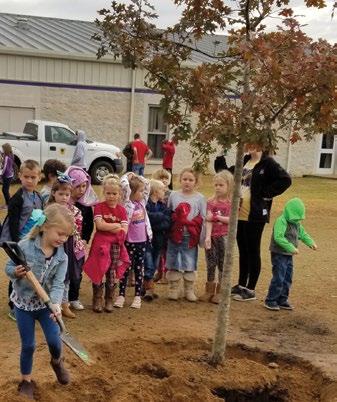
Cultivating leadership in public policy since 1939. GROW WITH US
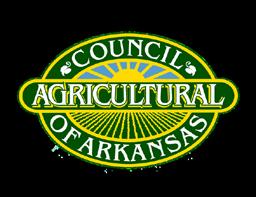
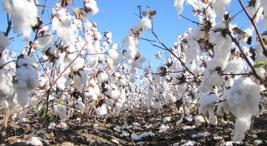
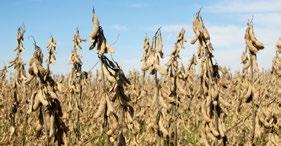

Agriculture is more than land and crops; it is Arkansas's economic foundation. We promote this industry and advocate for its future and our state's prosperity.
@ A G C O U N C I L O F A R A G C O U N C I L . N E T / J O I N
Our roots run deep in agriculture.
Simmons Bank is proud to be a homegrown product of Arkansas. So we know the important role agriculture plays in our local and national economies. Our history can be traced back to the deep farmland roots of the Mississippi Delta — a strength of our business that continues today. So if you’re looking to expand your farming operation, buy new equipment or purchase livestock, stop by today and talk to an agricultural lending specialist.
Subject to credit approval.
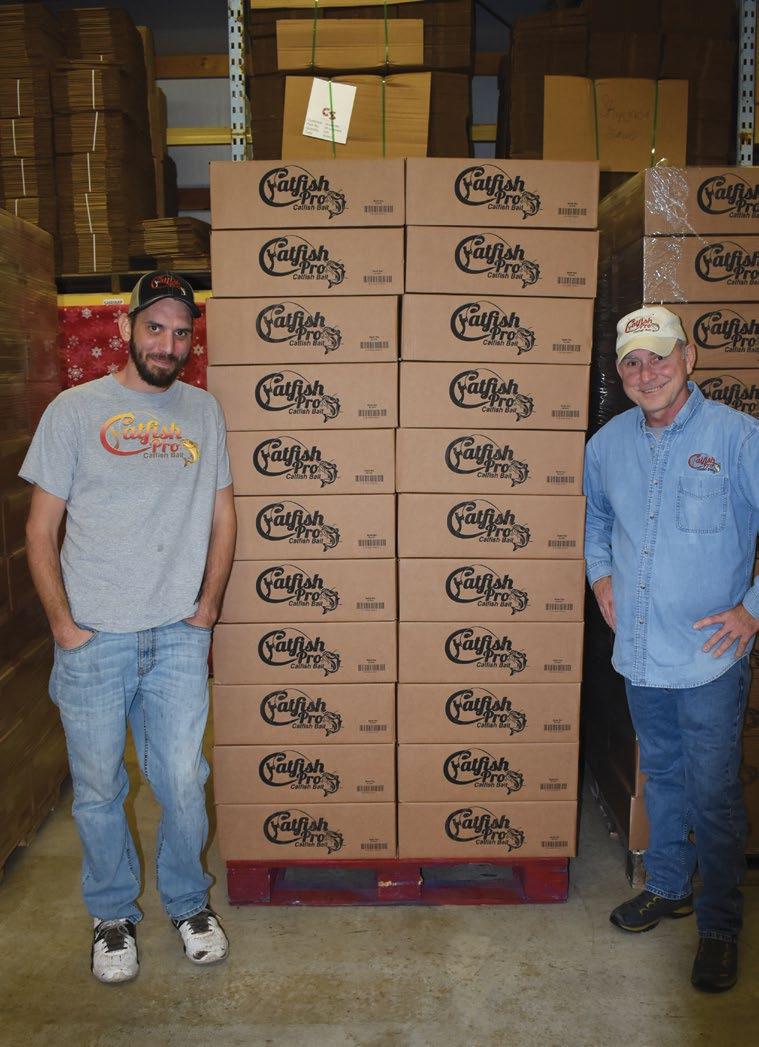
Hook, Line, and Sinker
The Producers of Catfish Pro Catfish Bait, an Arkansas Made Fish Bait, Make a Big Splash
Mike Baker didn’t catch a single catfish during one fishing trip to the Arkansas River in 2013, but he did catch an inspiration. Frustrated by baits that wouldn’t stay on the hook, Baker made a vow during his ill-fated excursion to create a new kind of catfish bait. Seven years, countless meetings and over 100,000 vehicle miles later, Baker’s Catfish Pro Catfish Bait keeps bait – and business – on the hook for the Springdalebased entrepreneur. “We sat down there all weekend and every time we threw something out, the bait would go one way and the line would go the other way,” Baker said of his fishing trip near the Ozark-Jetta Taylor Lock and Dam. “I told my wife, ‘I’ll tell you one thing. I’m going to make a bait that stays on your hook and catches catfish.” The composition of the bait makes it perfect for a simple J hook – no treble hooks or sponge hooks needed – and most importantly to Mike Baker, the bait stays on the hook when cast into the water. “We tell people this: A big part of fishing is the memories. A son or daughter can ask their mom, dad, or grandparent to take them fishing. Even if they are beginners, they can catch a fish with this bait. If they can make a memory, we’ve done something really good for someone.” Catfish Pro baits are available in more than 1,000 Walmart stores, thanks in part to Mitch Baker’s determination. Mike Baker estimates his son logged more than 60,000 miles one summer alone pitching Catfish Pro to stores and demonstrating the product. “Even if they are beginners, they can catch a fish with this bait. If they can make a memory, we’ve done something really good for someone.”
Baker went to work in their kitchen developing the bait with help from his wife, Sharon, son, Mitchell, and several experts, including Tyson Foods. Catfish Pro was incorporated in 2013 with its signature product, a bait cube made of all-natural ingredients and designed to stay on any kind of hook.
The Bakers said the unique cube shape does not break down in water as quickly as the traditional rounded bait, and releases a scent trail in the water faster than the traditional rounded bait. The signature scent attracts fish and is released only while in water, in contrast to the “stinky hands” anglers may get when using other artificial catfish baits. This year, six different Catfish Pro baits will be available at Walmart stores across the country, as well as selected Academy Sports and Scheels. Local bait shops in the region carry Catfish Pro and the bait is always available on the company’s website, catfishpro.com.
Mike Baker said the company initially targeted Walmart because “it’s the number one retailer in the world and we have so much confidence in our product."
“Mitchell went on the road going to Walmart after Walmart demonstrating the product and asking them to sell the bait,” he said. “Mitchell was the one out there on the road with all the windshield time.”
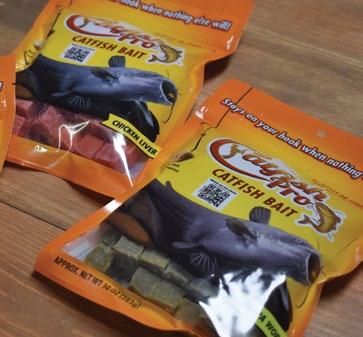
Catfish Pro asks for volunteers to use the bait on the Catfishing America Facebook page which has nearly 50,000 members. Those volunteers provide vital performance information that is used for product development.
“We use high fatty amino acids, proteins, and 100% natural ingredients: real blood, real shad, real catalpa worms,” Mike Baker said as he identified the eight flavors of Catfish Pro bait available for purchase. “I’m not a professional fisherman by any means. That’s one reason our bait works. I had to make it so that anyone could use it.”
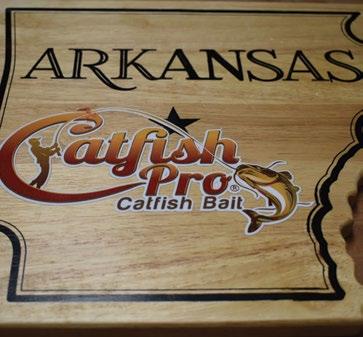
The company’s founder said Catfish Pro plans an overhaul of its website this year to make it an online destination for catfish anglers. They’ve already developed specialty hooks and rods and are evaluating a prototype reel for the brand’s online store.
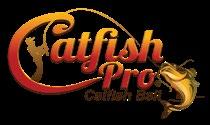
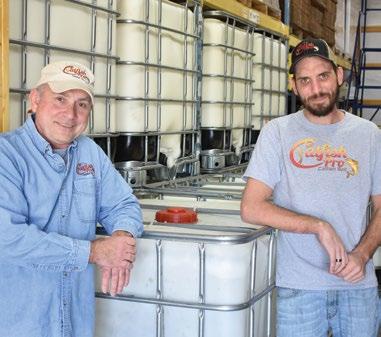
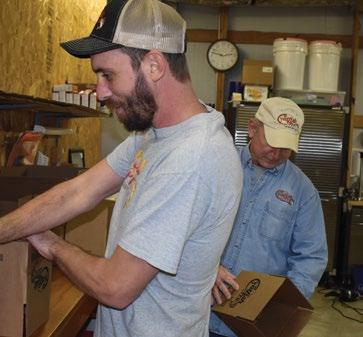
ARKANSAS POULTRY INDUSTRY
P O U L T R Y
is the
LARGEST agriculture commodity in Arkansas
In 2018, ONE BILLION broilers were raised and processed for distribution across the nation
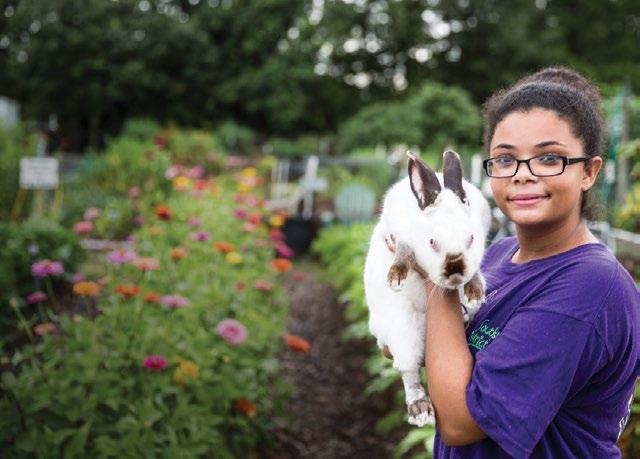
Your donation helps create the next generation of leaders . Visit us online to invest in the future. Invest Inspire Impact
OVER 6,000
FARMS IN
produce some type of poultry
BENTON is the No.1 poultry producing county
www.arkansas4hfoundation.com The University of Arkansas System Division of Agriculture offers all its Extension and Research programs and services without regard to race, color, sex, gender identity, sexual orientation, national origin, religion, age, disability, marital or veteran status, genetic information, or any other legally protected status, and is an Affirmative Action/Equal Opportunity Employer.










